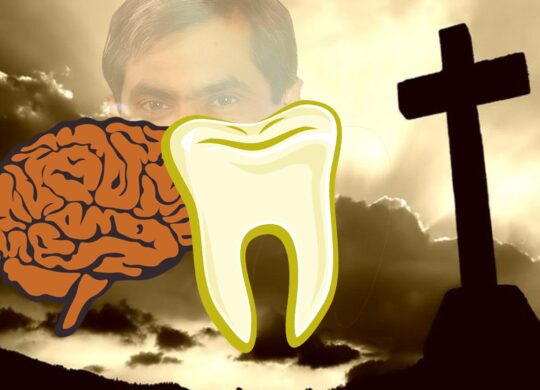Oral!

Your mouth affects your brain!
Emerging evidence suggests that what goes on in our mouth can affect what goes on in our brain—and may even potentially affect our risk for dementia.
Anita Visser, professor in geriatric dentistry at the University of Groningen in the Netherlands:
People should really be aware that oral health is really important.”
Yes, really! Severe periodontal disease affects about 19 percent of people older than 15, i. e., over 1 billion people worldwide, according to a 2022 WHO report.
But how is the brain affected? Bacteria and inflammation, saith scientists.
Researchers tracked 144 aging nuns and found that severe tooth loss was associated with dementia risk up to 6.4 times higher than compared with those who lost fewer teeth. In another small study of 60 patients with mild to moderate dementia, periodontitis was associated with a 6-fold increase in cognitive decline. Then there was the big study—28,000 subjects in Taiwan in 2017—that showed that having chronic periodontal disease for 10 or more years corresponded to a 1.7 times increase in the risk for Alzheimer’s disease. Meta-analysis of these and 40 other studies report poor oral health is associated with both cognitive decline and dementia.
But is oral health a cause of dementia or an effect thereof?
Said Visser, who wrote a recent review on the association of oral health and Alzheimer’s:
It’s really complicated. And this is why we cannot say, ‘Oh, if you have periodontitis, you will get Alzheimer’s disease.’ But we know now that if you have severe periodontitis, the chance of getting Alzheimer’s disease is bigger.”
For one, Porphyromonas gingivalis bacteria that normally reside in our mouth may also infect the brain and potentially contribute to neurodegeneration in Alzheimer’s disease. These beasts were found in brain autopsies from Alzheimer’s patients and in the cerebrospinal fluid of such patients. And orally infecting mice with these critters led to the presence of typical Alzheimer’s protein tangles in their brains.
For another, dental plaque, the biofilm that forms with poor oral hygiene, teems with acid-producing bacteria. And thus inflammation.
Visser:
The whole body is fighting against this bacteria. The immune system is really provoked and alert and working really hard against these bacteria.”
This chronic inflammation can spill from the mouth into the rest of the body. Gum disease is linked to an increase in pro-inflammatory molecules in the blood, and can, in turn, lead to chronic inflammation in the brain, which induces neurodegeneration and plays a key role in Alzheimer’s.
For there is no truthfulness in [my foes’] mouth;
their inward part [is] destruction.
An open tomb their throat;
with their tongue they flatter.
Psalm 5:9
Bad oral hygiene!
And that has consequences:
For You are not a God who takes pleasure in wickedness;
with You no evil dwells. …
You destroy those who speak falsehood;
the person of bloodshed and deceit Yahweh abhors.
Psalm 5:4, 6
As for those who brush and floss …
But I—in Your abundant lovingkindness, I enter Your house;
I bow down at Your holy temple in fear of You.
Psalm 5:7
Those with bad mouths are in trouble:
Hold them guilty, God;
may they fall by their plans.
In the abundance of their insurrections thrust them out,
for they are rebellious against You.
Psalm 5:10
But God’s people:
But may all who seek refuge in You rejoice;
forever may them shout with joy;
and You put a cover upon them ….
For You—You bless the righteous one, Yahweh,
with favor like a shield You surround him.
Psalm 5:11–12
SOURCE:The Washington Post












 Abe Kuruvilla is the Carl E. Bates Professor of Christian Preaching at The Southern Baptist Theological Seminary (Louisville, KY), and a dermatologist in private practice. His passion is to explore, explain, and exemplify preaching.
Abe Kuruvilla is the Carl E. Bates Professor of Christian Preaching at The Southern Baptist Theological Seminary (Louisville, KY), and a dermatologist in private practice. His passion is to explore, explain, and exemplify preaching.